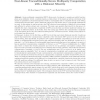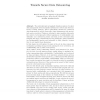948 search results - page 161 / 190 » What can we achieve by arbitrary announcements |
BMCBI
2006
13 years 7 months ago
2006
Background: Selection of relevant genes for sample classification is a common task in most gene expression studies, where researchers try to identify the smallest possible set of ...
IACR
2011
12 years 7 months ago
2011
Secure multiparty computation (MPC) allows a set of n players to compute any public function, given as an arithmetic circuit, on private inputs, so that privacy of the inputs as we...
VLDB
2007
ACM
14 years 7 months ago
2007
ACM
The networked and increasingly ubiquitous nature of today's data management services mandates assurances to detect and deter malicious or faulty behavior. This is particularly...
SODA
2008
ACM
13 years 9 months ago
2008
ACM
We analyze several distributed, continuous time protocols for a fair allocation of bandwidths to flows in a network (or resources to agents). Our protocols converge to an allocati...
ASIACRYPT
2011
Springer
12 years 7 months ago
2011
Springer
A cryptographic assumption is the (unproven) mathematical statement that a certain computational problem (e.g. factoring integers) is computationally hard. The leakage-resilience l...



